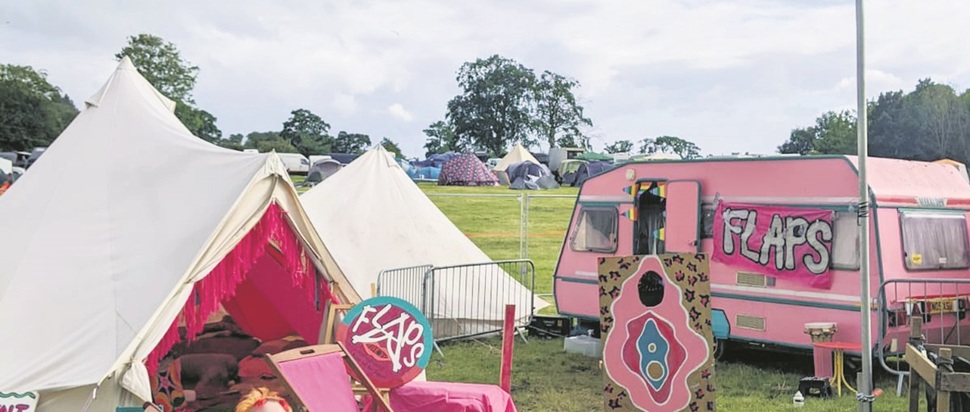In conversation with FLAPS
We chat with feminist collective FLAPS (Fannies Listening with Advice and Peer Support) about their work in creating safe spaces at music festivals through sexual and emotional welfare provisions
For many of us, the arrival of spring means one thing: festival season. Plots of farmland emerge as makeshift cities; public parks become awash with music, amplified above the rumble of roadworks; castle grounds transfigure momentarily, inviting thousands of revellers to dance, experiment and connect. The magic of these temporary utopias lies in their detachment from daily life – yet for many attendees, the spell is broken by unwanted sexual behavior.
Research conducted in 2022 (by Hannah Bows et al) found 34% of women and 6% of men experienced sexual harassment at a festival in the previous five years. In anticipation of the festival season’s return following COVID-19 restrictions, Fannies Listening with Advice and Peer Support (FLAPS) was created in 2022 by members of feminist collective Fanny Riot. Through the provision of sexual welfare services, an on-site safe space and tailored training workshops, the FLAPS crew have tasked themselves with enhancing festival safety from the inside out.
Marie, Ruby and Hannah have been active members of FLAPS since its conception. “We were all feeling very angry and frustrated about so many things that were going on in our communities and in the world at large,” says Ruby, “We all gravitated towards this issue and that became our focus.” These fledgling discussions have since progressed into the many strands of the FLAPS project, ranging from immediate support to the provision of free menstrual and sexual health products to anyone who might need them.
The collective noticed a considerable lack in services, support and transparency surrounding sexual and emotional welfare at Scottish festivals. A 2022 study conducted by Fanny Riot, in partnership with Popgirlz Scoltand and POWA Scotland, found only two out of 60 festivals in Scotland displayed a formal sexual violence policy on their website. The campaign, Friendly Fests Scotland (FFS), aimed to kickstart the conversation about harassment and assault at festivals. “You can have policies in the background, but that means nothing to anyone trying to see whether a space is safe,” Marie says. “You have to be visible with what you do.”
This visibility may come in the form of the onsite work the FLAPS volunteers conduct with their festival partners. Festivalgoers at Kelburn Garden Party, Hidden Door Arts and Solfest have likely seen the hot pink boiler suits, the fuchsia-tasseled teepee, or the FLAPS caravan (baby pink, of course). The collective’s services range from outreach games around the festival site to specialist one-on-one support in the caravan. “[We work] in collaboration with the event control teams, welfare and first aid as a unified safety net,” says Hannah. “It's an on-call service overnight. So no matter the time of day, if somebody is struggling, then one of us is available to help.”
Festivals can be overwhelming: sobriety is scarce; the novelty of tent-life wears off when the rain starts; and the neverending fields can feel a long way from home. FLAPS offer their services to anyone who might need a breather, a calming space or someone to lend an ear. “We start from a place of active listening,” says Ruby. “Even just giving prompts to do a bit of grounding and mindfulness... We're very attuned through [our] training to help somebody to process whatever feeling they might be having in that moment.”
The preparation the FLAPS volunteers undergo before the festival season is extensive. “The training that we do with our team is absolutely key,” says Ruby. “[It] draws on the training that we, as the core team, have done with the Good Night Out campaign and Rape Crisis Scotland.”
The FLAPS team is often 20 people strong for good reason. “We've always got people to dip in and out,” Marie says. “If somebody's feeling a bit down they can go and have a sit down and a cup of tea. It's all about us as a group just keeping our energies up. It would be sad if we were very serious with our pink boiler suits on and with our pink fluffy vulva-looking tent!” Care for the team is as important as care for festivalgoers.
Team bonds are strong, as are the relationships cultivated between FLAPS and their festival partners. From crew members to festival organisers – FLAPS offers knowledge, support and welfare across the board. “If [festivals are] in touch with us, it’s because they really want us to work with them,” says Marie. Such conversations will often take place months in advance. “We want to make sure that we're not a plaster; we want to change the scene from the inside out.”
The FLAPS ethos of championing a culture of consent extends beyond the festival gates. “While a lot of what we're doing is reactive to things in the environment, it's also preemptive,” Hannah says. “Festivals are a microcosm of community. It's a really concentrated environment that mirrors the outside world. If we can take [this ethos] to that kind of space, then hopefully we can have that preemptive culture of consent everywhere.” Long after the party is over, these pink-cladded activists persist with making Scotland’s music scene that bit safer.
Find out more about FLAPS on Instagram @theflapsproject; the collective is currently welcoming volunteer applications for summer 2025
